…me q’ólthet we wáyeles means ‘…to come back/return tomorrow’. This is part of a larger sentence.
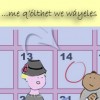

…me q’ólthet we wáyeles means ‘…to come back/return tomorrow’. This is part of a larger sentence.
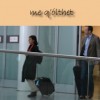
Me q’ólthet means ‘to return’ or ‘to come back’.
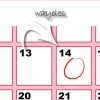
Wáyeles means ‘tomorrow’.
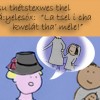
Osu thétstexwes thel á:yelesóx: “La tsel i cha kwelát tha’ méle!” means ‘So she said to my (late) mother: I am going to take your daughter’.
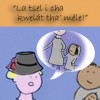
La tsel i cha kwelát tha’ méle means ‘I am going to take your child’. (Note: when the xwelitem lady says this, she means that she is going to take Elizabeth on a short trip only; this will become clear later in the story.)
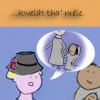
…Kwelát tha’ méle means ‘…take your child’. This is not a command, but rather part of a larger sentence which we will build up to in the next few posts.
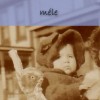
Méle means literally ‘child’‘. You use méle to refer to people’s family members, not just any young person. (As a general term for any ‘young person’, regardless of whose child they are, you can use a different word: stá:xwelh – child for any young person.)

Kwelát means literally ‘to grasp, to take hold of’. You can also use it more generally for related meanings including have, get, bring and take.
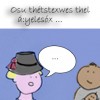
Osu thétstexwes thel á:yelesóx… here means ‘So (she) told my mother…’ (literally: ‘told my late ancestor’). The ‘she‘ is just understood from context.
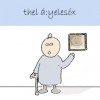
Thel á:yelesóx means ‘my late relative’. Literally it means ‘one who has left me’, or ‘one who has departed me’. This is a common way to refer to deceased family members, and here Elizabeth uses it to refer to her late mother.
